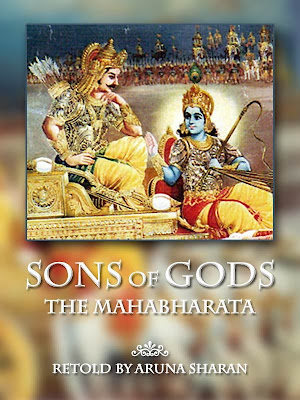Myths of Mankind: The Mahabharata. Part Four
Mythology and Religion
"Indian mythology is like a mirror that shows their hearts' desire to all who look into it. So the Hindu in his shrine might greet you with : 'So you are a follower of this Jesus, brought his image with you! He is very nice too! Put him up there too in the shrine, there’s plenty of room!'
"It is so because the original idea was never abandoned; it was merely enlarged, expanded upon for every imaginable taste. To this day though, in his heart, the Hindu really only believes in One ineffable God, creator of everything, to whom everything returns. Not the Christian father high up in heaven but inside us, everywhere, in all.
Sometimes this One is known as Para Atman, whereas the individual soul is atman. Para means supreme: the Supreme Soul.
"Our mind, our senses, separate us from that Soul. Our desires with which we shape the world around us distance us from the divine. So desire triggers the actions that shape reality but desires can never be satisfied, because they are illusory: what is called Maya, illusion, that is both the architect and the substance of this world."
From: Myths of Mankind: The Mahabharata, Part 4
"Indian mythology is like a mirror that shows their hearts' desire to all who look into it. So the Hindu in his shrine might greet you with : 'So you are a follower of this Jesus, brought his image with you! He is very nice too! Put him up there too in the shrine, there’s plenty of room!'
"It is so because the original idea was never abandoned; it was merely enlarged, expanded upon for every imaginable taste. To this day though, in his heart, the Hindu really only believes in One ineffable God, creator of everything, to whom everything returns. Not the Christian father high up in heaven but inside us, everywhere, in all.
Sometimes this One is known as Para Atman, whereas the individual soul is atman. Para means supreme: the Supreme Soul.
"Our mind, our senses, separate us from that Soul. Our desires with which we shape the world around us distance us from the divine. So desire triggers the actions that shape reality but desires can never be satisfied, because they are illusory: what is called Maya, illusion, that is both the architect and the substance of this world."
From: Myths of Mankind: The Mahabharata, Part 4



Comments